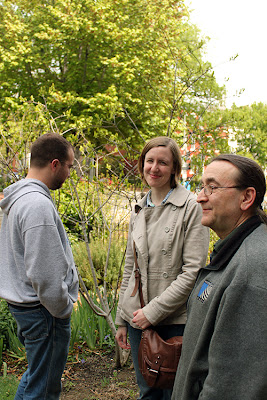In the Quaker community, there is a huge amount of tension around the spiritual significance of money, paid work and ministry. The Quaker movement rose up in part as a reaction against the abuses of a privileged clergy that treated the Church as a source of revenue. In George Fox‘s day, the clergy represented an abusive, landed elite that lived in luxury and defended a corrupt political and economic system.
 Although the majority of Quakers today hire pastors, we still retain a deep skepticism of paid ministry. Even among Friends congregations with paid staff – whether they call them “Meeting secretaries,” “pastors,” “youth coordinators” or “Friends in residence” – the pay is very, very low. Frequently, our pastors and other released ministers are forced to live at a subsistence level, find additional employment, or rely on a spouse or loved ones to make ends meet. The wages of sin may be death, but the wages of ministry are often not much better!
Although the majority of Quakers today hire pastors, we still retain a deep skepticism of paid ministry. Even among Friends congregations with paid staff – whether they call them “Meeting secretaries,” “pastors,” “youth coordinators” or “Friends in residence” – the pay is very, very low. Frequently, our pastors and other released ministers are forced to live at a subsistence level, find additional employment, or rely on a spouse or loved ones to make ends meet. The wages of sin may be death, but the wages of ministry are often not much better!
Though many Quaker ministers would love to get a full-time paycheck for the vital work that God has called them to, most of us do not ask for that. We generally pay our own way, grateful for God’s miraculous provision by other means. Finances are important, but we know from experience that the Lord will take care of these logistical details. The deeper question is one of solidarity. Do our Meetings truly embrace the ministry that arises in our midst – regardless of whether we ultimately feel led to financially release it?
What do we do when a sister feels God is directing her to travel to visit other churches, without a pre-set agenda? What happens when one of our brothers comes to us and explains to us that God is leading him into full-time ministry as a prophetic musician? How about when someone is feeling called into a missionary effort right here in our own city? What is our posture towards the new things that Jesus is doing in our life together?
- Do we truly value gospel ministry?
- Do we believe that God’s work in the world is worth the cost?
- Do we place our love for our brothers and sisters above our fear of not having enough?
- How do we live in solidarity with those who are called into a ministry that demands their primary focus and makes paid employment challenging?
- Do we trust that God will provide for our needs, even if this providence looks very different from what we would prefer?
- Do we keep our hearts and minds rooted in the love that God has for his people, even when they disappoint us?
- How do we avoid bitterness that can sour our ministry?
- If God requires it of us, are we willing to work twice as hard, earning our own living whilepreaching the gospel?
- Are we willing to “endure anything rather than put an obstacle in the way of the gospel of Christ?”


